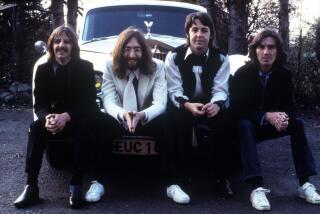NONFICTION - Jan. 29, 1995
THE LOST BEATLES INTERVIEWS by Geoffrey Giuliano (Dutton: $23.95; 398 pp.) The “lost” Beatles interviews? Hardly--more like barrel-scrapings--for after writing a handful of other books on the Beatles, including biographies of George Harrison and Paul McCartney, Geoffrey Giuliano calls it quits and pours his leftover research into one final volume. There are some interesting conversations to be found here, but “The Lost Beatles Interviews” consists primarily of odds and sods that say much more about entertainment journalism than the Beatles. The first third of the book is largely made up of press-conference transcripts from the mid-1960s, and they are exceptionally inane: one reads them only to admire the Beatles’ ability--and all four had it--to respond wittily to stupid questions. (When asked by a Hollywood reporter in 1966 how the Beatles’ image had changed since 1963, for example, Harrison replied, “An image is how you see us, so you can only answer that.”) The rest of the book is somewhat better, being weighted toward one-on-one interviews with Beatles’ associates--drummer Pete Best, musician (and Rutle) Neil Innes, Yoko Ono, and so on--but Giuliano seems more interested in gossip and sales than in the Beatles’ music: indeed, he includes in the volume--talk about dregs!--the transcript of a 1993 Toronto talk show in which he defends himself from charges of celebrity exploitation by telling the host, “Look, you want ratings. I want books sales. What’s wrong with that?” A couple of serious interviews stand out--those with producer George Martin and engineer Geoff Emerick, in which they describe the primitive technical wizardry behind the Beatles’ sound, and with John Lennon’s half-sister Julia Baird. In the late 1970s, after being out of touch with Lennon for many years, Baird called him in New York and found her brother so warm and friendly she determined to do something for him. “You couldn’t really buy him anything he doesn’t have bigger, better and 10 of already,” she told Giuliano. “So I decided I would get an elegant Irish tablecloth and embroider it for him.” Baird worked on the gift for two years, hoping to complete it in time for her brother’s planned visit to England in the early 1980s, but Mark David Chapman made sure the reunion never occurred.
More to Read
Sign up for our Book Club newsletter
Get the latest news, events and more from the Los Angeles Times Book Club, and help us get L.A. reading and talking.
You may occasionally receive promotional content from the Los Angeles Times.








